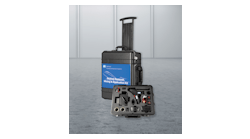Henkel to Present its Composite Solutions for the Automotive and Aerospace Industry
|
The JEC Europe 2013 is the biggest composites exhibition in Europe and in the world. Congregating 250,000 professionals from 100 different countries, the JEC Europe 2013 will take place this year from March 12 to 14 at the Porte de Versailles, in Paris, France. Henkel, the world’s leading producer of adhesives, will present composite solutions for the automotive and aerospace industry. The main focuses will be the innovative fast curing composite matrix resin Loctite MAX 2 for automotive and a complete portfolio of Benzoxazine based composite products for aerospace applications. Loctite MAX 2 is a polyurethane based resin system that cures faster than traditional epoxy resins where as the Benzoxazine resin based composite and complementary products changes the paradigm of performance and temperature profile of traditional systems. |
|
|
|
JEC Europe in Paris is the only trade show that unites the global composite industry recording more than 86 percent of visitors’ growth in 10 years. In 2012, the JEC Europe exhibition attracted 1,181 participating companies and about 32,256 visitors. At this leading European and international event, Henkel will be showcasing its portfolio of composite products for the automotive and aerospace industry. Along with demonstrating the advantages of the products, Henkel representatives will exchange their expertise and experiences with other professionals. As the transport industry constantly changes and seeks effective solutions for tomorrow, Henkel is dedicated to providing the competitive advantage for customers along the entire value chain of manufacturing and maintenance. Based on innovation and continuous dialog with design and construction specialists, Henkel experts who specialize in adhesive technologies can look back on a long experience in the field of composite solutions. With their superior strength-weight ratio, composite materials enable flexible designs and the ability to meet customer expectations in terms of comfort and overall operating costs. One-Minute curing time for the matrix resin Loctite MAX 2 This revolutionary fast-curing composite matrix resin is the result of a collaboration between Henkel and KraussMaffei, one of the world’s leading makers of manufacturing and processing machinery for plastics, aimed at achieving further reductions in the manufacturing cycle times for a broad range of composite components. With its rather extensive adhesives portfolio, Henkel is thus able to offer a complete and coherent system for the manufacture and integration of composite components in the automobile. Boarding time for Benzoxazine resins in composite materials Under the brand Loctite, Henkel has developed Benzoxazine resins for composite processes to provide benefits in every stage of the value chain. Major advantages compared to other technologies are higher service temperature, lower cure shrinkage, reduced micro-cracking, improved toughness and lower total manufacturing costs. The performance improvements enable further weight reduction in aircraft structures compared to the current generation composites. Loctite Benzoxazine resins can be stored at room temperature which, simplifies processing and substantially reduces the amount of waste due to expired products. Since refrigerated storage is no longer necessary, energy consumption during shipping and storage is significantly reduced. And these are not the only benefits of the new generation of resins and composites. Loctite Benzoxazine resins have the advantage of lower exothermic reactions. This means that the processing is more consistent for large and small components which, facilitates the scheduling of autoclaves. Loctite Benzoxazine resins are available in a variety of composite product forms, including prepregs and infusion resins. Henkel’s booth (Hall1, R45) at the JEC 2013 provides visitors with more information about Loctite MAX 2 matrix resins and Benzoxazine composites for the automotive and aerospace industry. |



